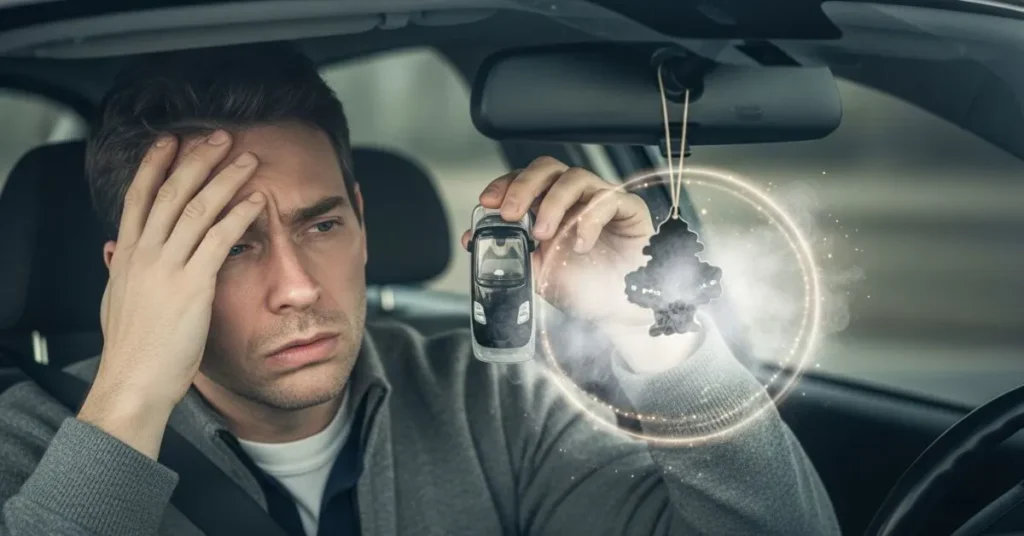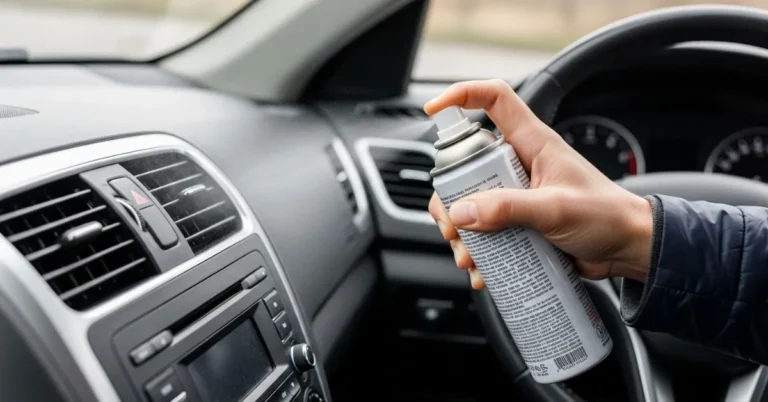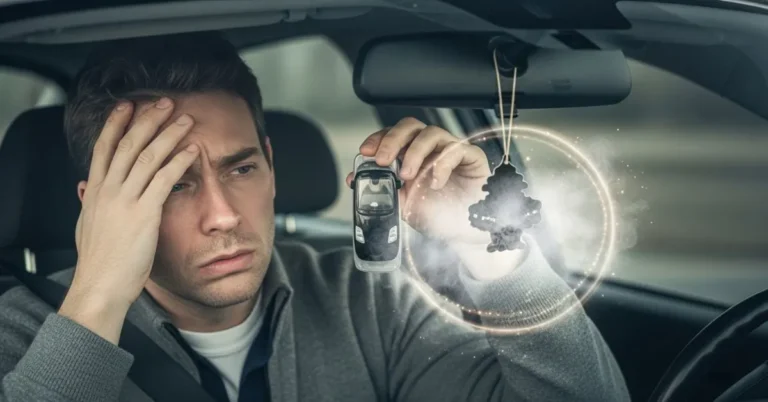
Can car air fresheners make you sick? Imagine this: It’s Monday morning. You grab your coffee, toss your bag in the passenger seat, and slide into your car. The air inside greets you with a warm wave of “New Car” scent even though your ride is a solid eight years old. You take a deep breath, close your eyes briefly, and feel instantly calmer.
But then, halfway to work, you notice a slight headache. Maybe your eyes feel watery, or you’re sneezing more than usual. You chalk it up to allergies, but the thought lingers. For many American drivers, air fresheners are as essential as the seatbelt yet the scents that make a commute bearable might also deliver more than just fragrance.
Let’s investigate what’s in that little tree, how it affects your health, and what safer, smarter options are available.
Contents
- 1 1. What’s Hiding Inside Your Car Air Freshener?
- 1.1 2. Can Car Air Fresheners Make You Sick? The Science
- 1.2 3. Immediate Symptoms You Might Notice
- 1.3 4. Long-Term Concerns You Shouldn’t Ignore
- 1.4 5. Who’s Most at Risk from Car Air Fresheners?
- 1.5 6. Common Types of Car Air Fresheners – Ranked by Safety
- 1.6 7. Safer Alternatives to Keep Your Car Fresh
- 1.7 8. The Sustainable Shift – A Growing Trend in the USA
- 1.8 9. Practical Tips to Reduce Air Freshener Health Risks
- 1.9 FAQs
- 1.10 Expert Thoughts: Balancing Freshness and Health
- 1.11 About the Author
1. What’s Hiding Inside Your Car Air Freshener?
From classic cardboard cutouts dangling on your mirror to high-tech essential oil diffusers, car air fresheners vary in design but most have one thing in common: they rely on chemicals to release scent.
The usual suspects include:
- VOCs (Volatile Organic Compounds) – These chemical compounds evaporate at room temperature, carrying fragrance molecules into the air. Common ones in air fresheners include formaldehyde, benzene, and toluene.
- Synthetic fragrances – Often derived from petroleum and mixed to mimic natural scents like lavender, ocean breeze, or pine.
- Solvents – Help spread the scent, but can irritate your lungs with prolonged exposure.
Fun fact: People love that “new car smell” so much. It’s mostly a cocktail of VOCs off-gassing from adhesives, plastics, and upholstery not exactly bottled freshness.
2. Can Car Air Fresheners Make You Sick? The Science
The short answer? Yes, depending on the type, your sensitivity, and exposure time.
Studies from the EPA and other environmental health agencies have shown that certain VOCs can cause short-term symptoms like:
- Headaches
- Dizziness
- Eye, nose, and throat irritation
- Nausea
- Worsened asthma symptoms
In small, enclosed spaces like a car, these effects can become more pronounced because less fresh air dilutes the chemicals. If you’ve ever installed a brand-new vent clip and felt lightheaded within minutes, you’ve experienced this firsthand.
3. Immediate Symptoms You Might Notice
Some people are more sensitive to chemical fragrances than others, but the most common short-term effects of overexposure to car air fresheners include:
- Scratchy throat or coughing
- Sneezing or watery eyes
- Skin irritation from direct contact
- A faint chemical taste in your mouth (yes, it’s as unpleasant as it sounds)
If you notice these symptoms only while in your car and they fade after leaving your air freshener may be the culprit.
Read More: Are Little Trees Car Air Fresheners Toxic to Humans?
4. Long-Term Concerns You Shouldn’t Ignore
It’s not just about a single headache on your morning commute. Long-term exposure to synthetic fragrances and VOCs may:
- Increase your risk of chronic respiratory problems
- Disrupt hormones due to phthalates (chemicals used to make scents last longer)
- Heighten chemical sensitivities over time
- Trigger migraines for people prone to them
The science is still evolving, but health experts generally agree that reducing unnecessary chemical exposure is a smart move.
5. Who’s Most at Risk from Car Air Fresheners?
Some drivers may never feel a thing, but certain groups are more vulnerable to chemical fragrance exposure:
- Children – Smaller bodies and developing immune systems make them more susceptible.
- People with asthma or allergies – Even low VOC levels can cause flare-ups.
- Pregnant women – Avoiding unnecessary chemicals is recommended.
- Elderly individuals – More prone to respiratory irritation.
If any of these passengers are frequent car passengers, you should rethink your air freshener choices.
6. Common Types of Car Air Fresheners – Ranked by Safety
| Type | Pros | Cons | Safety Rating |
| Hanging cardboard (Little Trees) | Cheap, widely available | High VOC release, short-lasting | ★☆☆ |
| Vent clip fresheners | Strong scent, discreet | VOC-heavy, often overpowering | ★★☆ |
| Gel cans | Long-lasting, easy to use | Still chemical-based | ★★☆ |
| Activated charcoal bags | Non-toxic, odor-absorbing | No added scent | ★★★★ |
| Essential oil diffusers | Natural fragrance, customizable | Risk of spills | ★★★★ |
Pro Tip: If you can smell it from outside the car, it’s probably too strong inside.
7. Safer Alternatives to Keep Your Car Fresh
- If you’re ready to freshen your ride without the health risks, here are some great eco-friendly, odor-trapping products that work by trapping odors rather than covering them up. These products are reusable for up to two years place them in the sun every month to recharge.
- Baking soda packs – Old-school, yes, but they work. Tuck a small fabric pouch of baking soda under a seat.
- Reusable essential oil diffusers – Add a few drops of lavender, peppermint, or citrus oil for a pleasant, customizable scent.
- Plant-based fabric sprays – Target upholstery odors with chemical-free options.
8. The Sustainable Shift – A Growing Trend in the USA
Eco-conscious drivers are moving away from single-use, chemical-based fresheners. Popular sustainable trends include:
- Bamboo charcoal bags – 100% natural, biodegradable, and recyclable.
- Refillable diffusers – Use the same unit and swap oils.
- DIY car scents – Think cotton balls soaked in essential oils stored in a small jar.
Not only are these options safer for your health, but they also keep plastic waste out of landfills.
9. Practical Tips to Reduce Air Freshener Health Risks
- Ventilate daily – Crack the windows for a few minutes when parked.
- Limit the number of fresheners – One product is enough; doubling up increases chemical load.
- Store extras outside the car – Prevents constant off-gassing.
- Switch to scent-free – If you have frequent symptoms, try going fragrance-free for a week and see how you feel.
Read More: Are Car Air Fresheners Bad for Dogs to Humans?
FAQs
1. Are all car air fresheners harmful?
Not all contain chemicals that may irritate sensitive individuals, but natural options like activated charcoal are much safer.
2. Can I make my car air freshener?
Absolutely! A small jar with baking soda and essential oils works wonders.
3. Do essential oils have any health risks?
They’re generally safe in moderation, but always choose high-quality oils and avoid overuse.
4. How can I tell if my air freshener makes me sick?
If symptoms like headaches, sneezing, or dizziness appear only when in the car, the freshener could be the cause.
5. What’s the most sustainable option for car freshness?
Bamboo charcoal bags they’re natural, long-lasting, and fully biodegradable.
Expert Thoughts: Balancing Freshness and Health
So, can car air fresheners make you sick? Yes, for some people especially with prolonged exposure in a closed vehicle. But the good news is, you don’t have to choose between a fresh-smelling ride and good health.
By switching to natural, reusable, and chemical-free options, you can protect yourself (and your passengers) while still enjoying that satisfying “just cleaned” feeling every time you hop in the driver’s seat.




